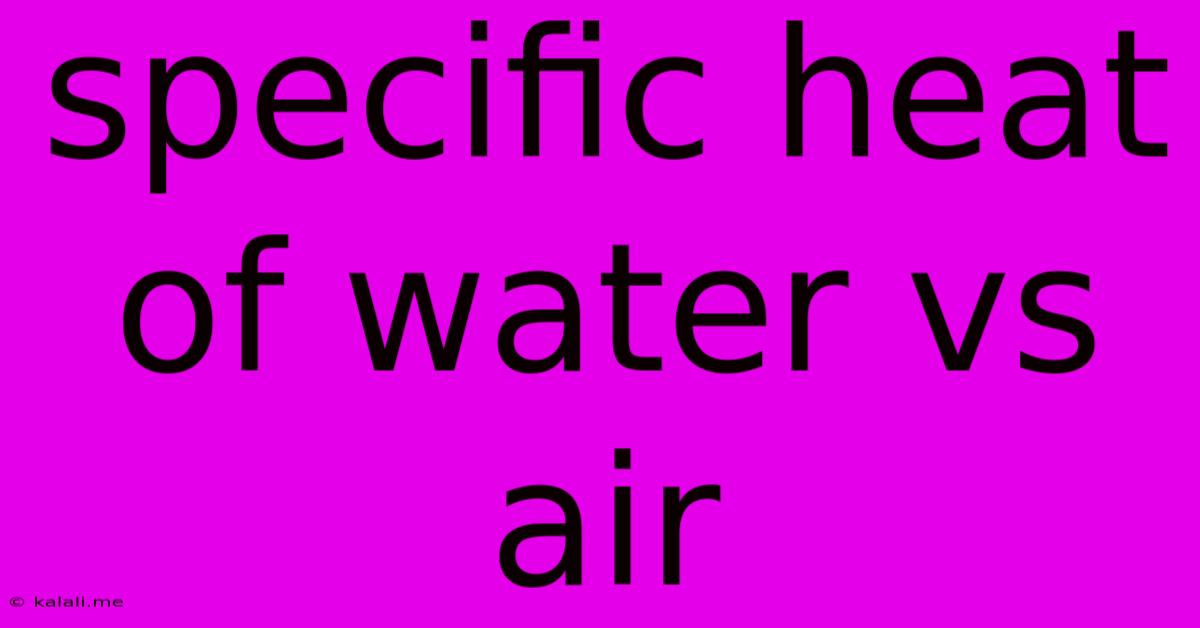Specific Heat Of Water Vs Air
Kalali
Jun 03, 2025 · 3 min read

Table of Contents
Specific Heat of Water vs. Air: Why Water Moderates Temperatures
Understanding the difference between the specific heat of water and air is crucial for comprehending various natural phenomena, from weather patterns to the importance of water in regulating body temperature. This article delves into the specifics, explaining why water's higher specific heat capacity has such a significant impact.
What is Specific Heat Capacity?
Specific heat capacity is the amount of heat energy required to raise the temperature of one kilogram of a substance by one degree Celsius (or one Kelvin). It's a measure of a substance's resistance to temperature change. A substance with a high specific heat capacity requires a lot of energy to change its temperature, while a substance with a low specific heat capacity changes temperature easily.
The Key Difference: Water vs. Air
Water possesses a remarkably high specific heat capacity compared to air. While the exact values can vary slightly depending on temperature and pressure, a commonly used approximation is:
- Water: Approximately 4,186 J/kg°C (Joules per kilogram per degree Celsius)
- Air: Approximately 1,005 J/kg°C
This means that it takes over four times more energy to raise the temperature of 1 kg of water by 1°C than it does for 1 kg of air. This fundamental difference has profound consequences.
Why Water's Specific Heat is So High
Water's unusually high specific heat capacity is due to the strong hydrogen bonds between its molecules. These bonds require significant energy to break, resulting in a greater resistance to temperature changes. This is in stark contrast to air, which is primarily composed of nitrogen and oxygen molecules with weaker intermolecular forces.
The Impact of this Difference
The vastly different specific heat capacities of water and air have several significant implications:
-
Climate Regulation: Large bodies of water, like oceans and lakes, act as massive heat sinks. Their high specific heat capacity allows them to absorb large amounts of solar energy without experiencing drastic temperature increases. This moderates coastal climates, preventing extreme temperature fluctuations between day and night, and across seasons. This is a crucial aspect of global climate stability and weather patterns. Ocean currents also play a vital role in distributing heat around the globe.
-
Body Temperature Regulation: The high specific heat capacity of water is crucial for maintaining our body temperature. Our bodies are approximately 60% water, and this water helps to buffer against rapid temperature changes. This thermal buffering capacity is essential for preventing overheating or hypothermia.
-
Weather Phenomena: The differing specific heats contribute to the formation of various weather patterns. For example, land heats up and cools down faster than water, leading to sea breezes and land breezes. The temperature difference drives air movement, creating wind.
-
Industrial Applications: The high specific heat capacity of water makes it an excellent coolant in various industrial processes. It's used in power plants, manufacturing, and other applications where efficient heat transfer is essential.
In Summary
The difference in specific heat capacity between water and air is significant and far-reaching. Water's exceptionally high specific heat capacity is a consequence of its molecular structure and hydrogen bonding. This characteristic has profound effects on climate regulation, body temperature control, weather patterns, and industrial applications. Understanding this fundamental difference provides valuable insights into numerous natural processes and technological advancements.
Latest Posts
Latest Posts
-
Santiagos Catch Old Man And The Sea
Jun 04, 2025
-
Bash Ulimit Open Files Cannot Modify Limit Operation Not Permitted
Jun 04, 2025
-
Why Does My Smoke Detector Keep Beeping
Jun 04, 2025
-
How Much Does A Motor Weigh
Jun 04, 2025
-
06 Chevy Silverado Radio Wiring Diagram
Jun 04, 2025
Related Post
Thank you for visiting our website which covers about Specific Heat Of Water Vs Air . We hope the information provided has been useful to you. Feel free to contact us if you have any questions or need further assistance. See you next time and don't miss to bookmark.